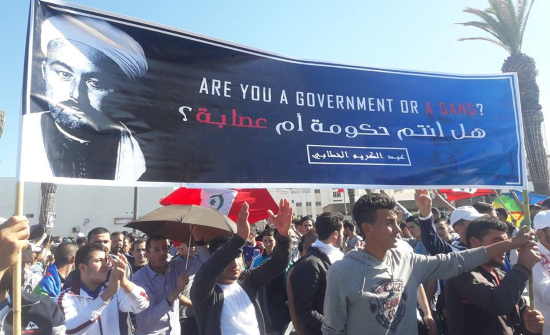
Ten months of mass protests have followed the murder by Moroccan police of Muhsin Fikri, a fisherman deliberately crushed to death in a garbage compressor truck in October 2016. Fikri had refused to pay a bribe to policemen who confiscated his stock because of seasonal restrictions on swordfish fishing. They flung his fish into a rubbish truck and, when Fikri leapt in to get it out, told the driver to crush the trash. A video of Fikri’s mangled body went viral, sparking huge protests across the country.
The demonstrations began in the Moroccan city of Al Hoceima in the historically-marginalised northern Rif region. These quickly grew into nightly protests involving tens of thousands of people in over 40 other towns and cities including the capital Rabat, Casablanca, Marrakesh, Tangier in the north and Agadir in the south. There have also been solidarity demonstrations in Spain and the Netherlands. Despite intense repression within the Rif region, a popular movement known as the Hirak al Shaabi or Popular Movement, sparked by the death of Muhsin Fikri has grown and spread outside the region. The movement is demanding jobs, schools, hospitals, an end to corruption and police brutality (‘No to militarisation’) and the release of all activists and political prisoners. Protesters in the Rif rebuffed delegations from government and refused to accept local politicians as intermediaries: they are instead demanding direct negotiations with the corrupt King, Mohammed VI.
Protests intensified following the arbitrary arrest of over 130 of the movement’s leaders, including Nasser al-Zefzafi, the movement’s most prominent face, in May. Amnesty International and Human Rights Watch have confirmed the prisoners have been beaten, tortured and threatened with rape. 100,000 demonstrators took to the streets of Rabat on 11 June 2017 in solidarity with the mass movement in the Rif, chanting ‘We are all Zefzafi’, and ‘We are all activists, catch us all!’
Part of the reason for the Hirak movement’s rapid growth is the lack of political outlets for popular dissatisfaction over soaring youth unemployment (25.5% in the first quarter of 2017, with urban youth unemployment at 38% in June 2016); a 33% illiteracy rate and widespread rural poverty concealed by official government statistics. Morocco’s economy is dependent on tourism, remittances and foreign direct investment (FDI). Tourism and remittances in 2016 represented 12.5% of GDP. FDI flows to Morocco are declining, as are grants from the Gulf GCC countries, and from the EU following the EU debt crisis. Although agriculture contributes 15% of GDP it employs 40% of the labour force, and 175,000 jobs were lost in 2016 due to drought. Labour force participation is now well below 48%.
The Rif region – where the majority speak an indigenous Berber dialect – has a long history of rebellion and marginalisation. From 1923 to 1926, under the Rif guerrilla leader Abdelkrim Al Khattabi, it briefly gained independence. However, after Abdelkrim refused to push on to the Spanish military stronghold of Melilla, naively saying he was ‘anti-imperialist and not anti-Spanish’, France and Spain, the colonial powers in Morocco, crushed the rebellion using mustard gas. Decades of repression (a crackdown in 1959 by the Moroccan authorities, using napalm, killed over 10,000 people) and economic neglect hardened northern nationalism. Splits in the ruling class have emerged with the Islamist PJD (Justice and Development Party), a coalition partner, condemning the six-party coalition government’s handling of the Hirak protests.
With economic problems created by the interventions of the IMF and World Bank mounting, Morocco hopes to address poor socio-economic prospects by bolstering ties to the African Union (AU), opening up economic opportunities and projected investment in banking and aviation. Morocco was readmitted to the AU in January – with 39 of 54 AU countries voting in favour. Morocco left the AU’s predecessor – the Organisation of African Unity (OAU) – in 1984, after it opposed Morocco’s 1976 occupation of Western Sahara. Western Sahara is rich in fisheries, oil and phosphates, which Morocco and EU nations exploit. France’s Total oil corporation has been granted licences for ‘reconnaissance operations’ covering the ‘Anzarane Block’, an offshore area of over 100,000 square kilometres off the shore of Western Sahara. Part of the government’s strategy has also been a public celebration of Morocco’s Amazigh (Berber) heritage and ‘Africanness’, as well as the resurrection of Abdelkrim’s image, to gain influence in the Sahel and the diplomatic support of sub-Saharan states in the Western Sahara conflict.
From 2004 Morocco became a ‘privileged partner of the EU in the field of political and economic cooperation’. Its main purpose is to stem the flow of migrants escaping poverty and repression in Africa. Migrants are beaten, terrorised and their possessions destroyed. We should support all those protesting against the repressive Moroccan state.
See Facebook for Hirak – Morocco Solidarity Initiative UK for more information.




